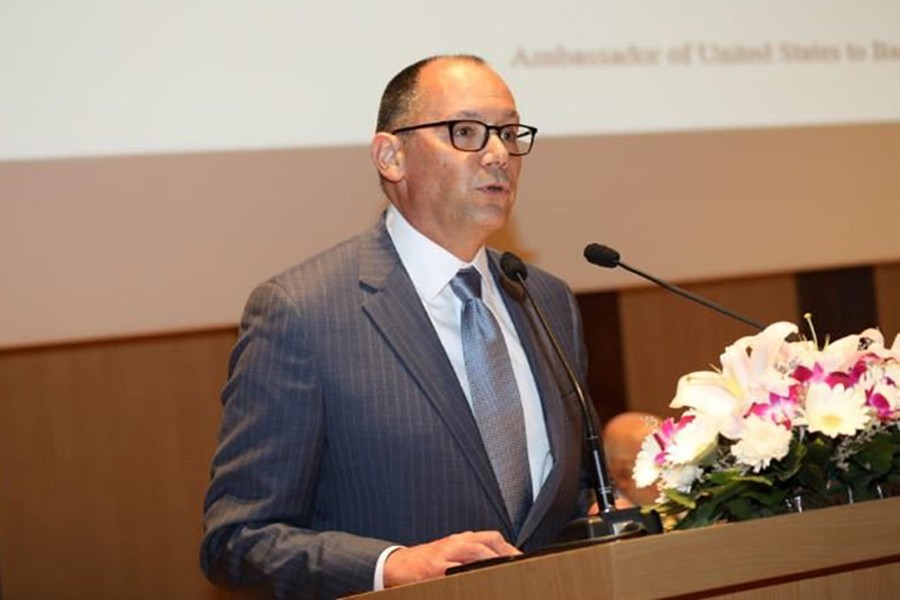Lauding Bangladesh’s role in fostering peace and prosperity in the Indo-Pacific region, newly appointed US Ambassador in Dhaka Peter Haas on Thursday said the United States wants to partner with Bangladesh to advance their shared goals.
“Bangladesh and the United States share different, but strikingly similar, visions for the Indo-Pacific region. We can – and do – work together to advance those areas where our visions overlap,” he said.
The US envoy made the remarks at an international conference titled ‘Moving Forward in the Indo-Pacific: Bangladesh’s Role in Fostering An Open, Resilient, and Interconnected Bay of Bengal and Beyond’ held at Independent University Bangladesh (IUB) in Dhaka.
He said Bangladesh Prime Minister Sheikh Hasina described Bangladesh’s vision - free, open, peaceful, secure, and inclusive region - for the region at the 2021 Paris Peace Forum and the United States wholeheartedly agreed, reports BSS.
Peter Haas said the United States’ Indo-Pacific Strategy has five key elements that will guide their long-term engagement in the region.
The United States envisions an Indo-Pacific that is: free and open, connected, prosperous, secure and resilient, he said.
He said today’s conference offers a chance to reflect on each of these pillars, on Bangladesh’s contributions to those, and how the US can partner with Bangladesh in the future to advance their shared goals.
“First, the United States will advance a free and open Indo-Pacific. This means a region where problems will be dealt with openly. Rules will be reached transparently and applied fairly. Individual countries will be able to choose their own path and their own partners,” the US ambassador said.
Noting that Bangladesh has made important contributions to this cause, he said for instance, by committing to the peaceful resolution of its land and maritime border disputes, Bangladesh has made the Bay of Bengal an example for the world to follow.
Peter Haas said a free and open Indo-Pacific is also a region where goods, ideas, and people flow freely across land, cyberspace, and the open seas.
“We will work with Bangladesh and other partners to ensure that the region’s seas and skies are governed and used according to international law. We will also seek to advance common approaches to critical and emerging technologies, the internet, and cyber space, that protect privacy and human dignity,” he said.
The envoy said the US will continue to forge stronger connections within and beyond the region and it must work together as a community to tackle shared problems.
Bangladesh is a committed leader to regional cooperation, as host to the BIMSTEC Secretariat, as chair of the Indian Ocean Rim Association, and as an active member of SAARC, the Colombo Plan, and more, he said.
Peter Haas said Bangladesh also knows the importance of helping neighbours, like through providing Covid-19 assistance to the Maldives, or supporting Sri Lanka last year with a currency swap at the height of its cash crisis.
Highlighting the existing good relations between the US and Bangladesh, he said economic relations between the two countries are expanding quickly including through an upcoming visit from a high-level delegation made up of US businesses coming here to investigate opportunities in Bangladesh.
Peter Haas said Bangladesh’s strong economic growth and entrepreneurial spirit drive the Indo-Pacific economy forward.
“As Bangladesh diversifies its industrial base, regional supply chains will become more resilient. And as labour rights and worker safety reforms take hold, the benefits of this growth will be shared more broadly,” he said.
He said the United States is the largest source of foreign direct investment in Bangladesh.
“As Ambassador, I commit to work with Bangladesh to build an attractive investment environment and support US investors to enter new sectors for the benefit of all our people,” the US ambassador said.
He said he is looking forward to working on climate and clean energy, fair trade facilitation, resilient supply chains, and the digital economy issues with the people and the government Bangladesh in the coming months.
“We will seek closer security cooperation with partners to tackle challenges ranging from violent extremism to illegal fishing to human trafficking where Bangladesh has made incredible strides,” he said adding that the United States is proud to partner with Bangladesh on these challenges.
In sum, Peter Haas said, the Indo-Pacific Strategy is a positive, shared vision for creating a region where all nations – Bangladesh, China, Sri Lanka, Indonesia, the United States, and each and every other county in the region - can thrive.


